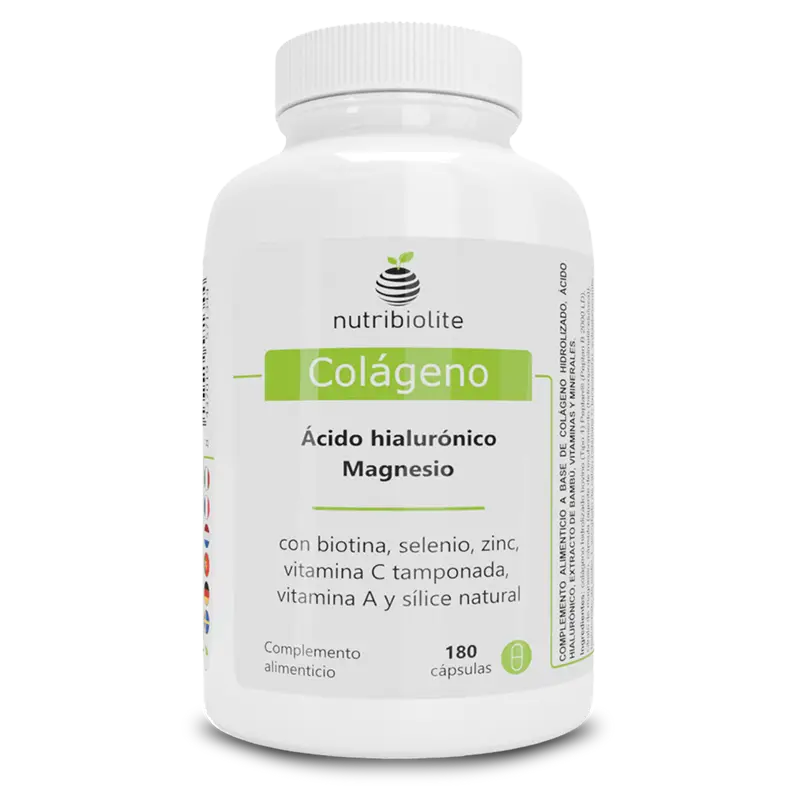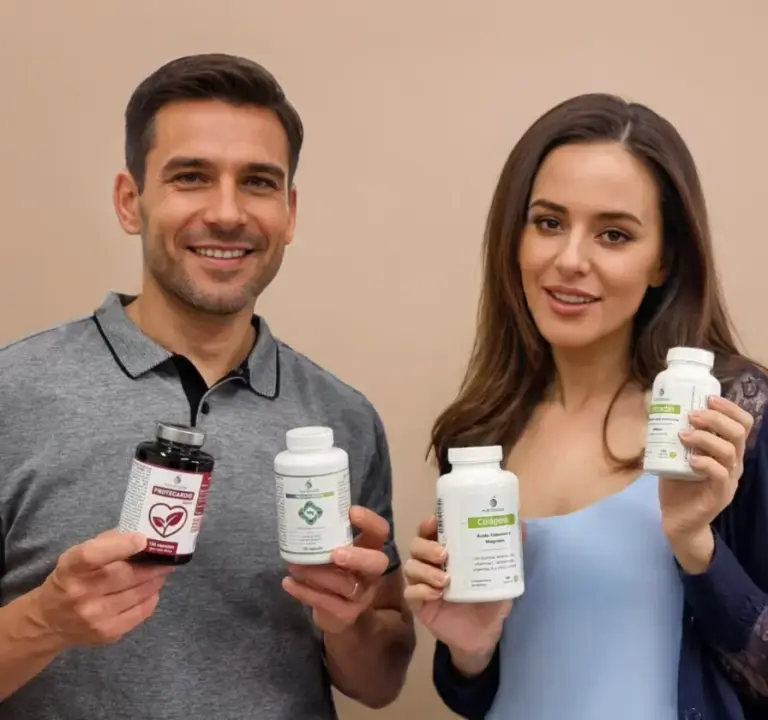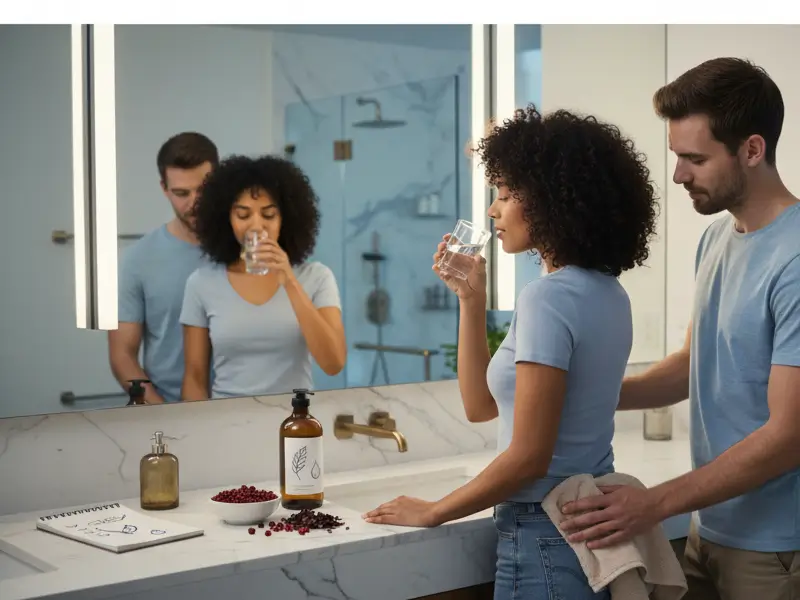A controlled clinical trial in 40 women aged 40 to 60 years, published in 2024 in the study in Skin research and technology : official journal of International Society for Bioengineering and the Skin (ISBS) [and] International Society for Digital Imaging of Skin (ISDIS) [and] International Society for Skin Imaging (ISSI) , evaluated an oral supplement with B vitamins, zinc and magnesium. After four months, the group taking the supplement showed fewer visible wrinkles, less facial redness and a lower overall skin ageing score than the control group.
The changes were modest but clear over a relatively short period. For middle-aged women with mild to moderate photoageing, these results suggest that certain oral nutrients, such as zinc and magnesium, can support the skin’s structure and inflammatory balance from within.
The study showed visible improvements in wrinkles and redness within four months.
The work was designed as a prospective, randomised controlled clinical trial. Forty healthy, immunocompetent women aged 40 to 60 with mild to moderate ageing on the Griffith scale were divided into two groups, one with daily oral supplementation and one without.
Assessments were conducted at three time points, baseline, two months and four months, over four months. Standardised photographs and an image analysis system called VISIA were used to quantify wrinkles, spots, redness and porphyrins, and a non-invasive depth imaging technique, dynamic optical coherence tomography, was used to analyse epidermis, collagen and blood vessels.
The supplemented group reduced their mean ageing score on the Griffith scale from 4.5 to 3.8, a statistically significant improvement. There was also a clear decrease in red areas on the face and a near significant reduction in the number of visible wrinkles. In the control group there were no relevant changes.
The authors point out that the sample size is small and that this is a pilot study, so the results should be interpreted with caution. Nevertheless, the consistency between clinical assessment and objective imaging measures reinforces the idea that nutritional support with micronutrients such as zinc and magnesium can have a real impact on skin appearance.
Inflammation, collagen and microvasculature, the physiology behind ageing skin
Skin ageing combines internal and external factors. Ultraviolet radiation, pollution and topical irritants generate a state of chronic, low-intensity inflammation, known as inflamaging, which damages collagen and elastin, alters the microvasculature and promotes wrinkles, sagging and persistent redness.
At the same time, with age, the repair capacity of the dermis decreases and the epidermis becomes thinner and drier. In menopause, hormonal decline accelerates the loss of collagen and elasticity. The result is a more fragile skin, with a duller tone and a greater tendency to inflammation and disorganisation of the extracellular matrix.
The supplement studied combined a botanical complex with B vitamins, zinc and magnesium. These two minerals are involved in hundreds of enzymatic reactions related to tissue repair, oxidative balance and inflammatory response. In the trial, the reduction of redness and slight collagen remodelling observed by imaging are interpreted as a possible anti-inflammatory and skin support matrix tightening effect.
In addition, the maintenance of porphyrin levels in the treated group, compared to the increase in the control group, suggests an impact on the skin microbiota and the state of balance of the skin surface. Although these aspects require further study, they point to an interesting pathway, oral nutrition modulating both inflammation and the skin ecosystem.
Daily habits that support the skin from the inside and out
The trial results add to an already well-known idea that skin responds best when external protection and internal support are combined. The first line of defence remains daily photoprotection, avoiding repeated sunburns and limiting exposure in the middle of the day.
In parallel, a diet rich in fruit, vegetables, legumes and healthy fats provides antioxidants and micronutrients that participate in collagen synthesis and control oxidative stress. Maintaining good hydration, reducing smoking and moderating alcohol is also associated with more stable skin and less visible inflammation.
In the cosmetic routine, gentle cleansers, sunscreen creams and well-formulated topical actives help preserve the skin barrier. Avoiding aggressive exfoliations and abrupt product changes decreases the likelihood of chronic irritation that can feed the inflammaging cycle.
In this context, oral supplements that provide nutrients involved in skin structure and metabolism, such as zinc and magnesium, are understood as a complementary support. They are not a substitute for habits, but they can add value for people looking to take a holistic approach to skin care.
How the study’s zinc and magnesium relate to collagen and holistic skin care
Although the clinical trial focused on a specific supplement with herbal blend, B vitamins, zinc and magnesium, its core message is clear. Certain oral micronutrients, including zinc and magnesium, are associated with skin that shows fewer visible wrinkles, less redness and a better overall assessment of ageing in middle-aged women.
This type of evidence fits with the approach of formulations that combine collagen, hyaluronic acid, silicon-rich plant extracts, vitamins and minerals such as zinc and magnesium. Collagen provides the protein building blocks that form the support network of the dermis, hyaluronic acid contributes to deep hydration and bamboo, because of its silicon content, is associated with the maintenance of connective tissues such as skin, hair and nails.
When key minerals such as zinc and magnesium are added to this structural base, physiological pathways that the study itself highlights are reinforced. Zinc is involved in protein synthesis and protection against oxidative damage, while magnesium is involved in cellular energy metabolism and the regulation of multiple enzymes related to tissue repair.
The combination of collagen, hyaluronic acid, bamboo extract, vitamins and minerals creates a more favourable internal environment for the skin to maintain its firmness, hydration and responsiveness to environmental stress. The trial in women aged 40-60 years does not directly study this particular formulation, but provides further support for the role of zinc and magnesium as nutritional allies in anti-ageing skin care strategies.

Supplements with collagen, hyaluronic acid, bamboo extract, vitamins and minerals such as zinc and magnesium are aimed at supporting skin structure and hydration from a physiological pathway, designed for adults who already take care of their nutrition and want additional support.
What we can take away from the study for daily skin care
The clinical trial in middle-aged women shows that a non-invasive strategy, based on nutrients such as zinc and magnesium, can be associated with a moderate reduction in wrinkles and redness in just four months. The aim is not to radically transform the skin, but to accompany its repair and balancing processes.
In practice, this translates into three pillars: constant sun protection, lifestyle habits that reduce chronic inflammation and, for those who consider it appropriate, the use of supplements containing collagen, hyaluronic acid, plant extracts and minerals involved in skin physiology. The sum of these factors is what makes the difference in the medium and long term.
This content is informative and does not replace the advice of a health professional.
Frequently asked questions
What role did zinc and magnesium play in the study on skin ageing?
The supplement tested included zinc and magnesium along with other ingredients. After four months, the treated group showed less redness and fewer visible wrinkles than the control group, reinforcing the case for these minerals in skin care strategies from within.
What it means that the results of the study are modest but significant
It means that the changes are not dramatic, but they are measurable and consistent across trials. The low ageing score and the images showed less redness and fewer wrinkles, indicating a real improvement within a reasonable range.
How long it takes to see changes in the skin with nutritional support
In the trial, assessments at two months already showed favourable trends and at four months the changes were clearer. In practice, the skin often needs several weeks of consistency to reflect adjustments in nutrition and habits.
Why a non-invasive approach to skin ageing care?
Because the study was based on oral supplementation and imaging techniques that do not require needles or surgery. It is about intervening through nutrients and measuring changes with objective tools, without aggressive procedures.
How do collagen and mineral supplements fit into an anti-ageing routine?
These supplements provide structural components, such as collagen and hyaluronic acid, along with minerals such as zinc and magnesium involved in repair and oxidative balance. They work best when integrated into a lifestyle that already includes good nutrition, sun protection and appropriate topical care.
















